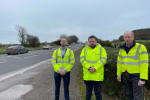I have written a full response to the Department for Transport’s white paper on the National Bus Strategy which I would like to share with you here. You can find it at the bottom of this page.
I believe the National Bus Strategy is a good strategy that will work well in lots of parts of the country, but I am concerned that it doesn’t fully address the problems we face with buses in rural areas such as West Dorset.
When I was elected in December 2019, one of my main priorities was to sort out bus provisions in West Dorset and this response forms part of my continued work to press the Government to make proper funding available to Dorset Council so that they can improve bus routes across the county, and to find innovative solutions to rural problems.
My paper is in three parts: rural bus services, franchising, and the elements of the Strategy that I think are good.
Rural Bus Services
In my view, it seems that this white paper is targeted towards urban areas, and urban solutions to rural problems tend to be what is written about. We are expecting a specific strategy for rural transport, but as it stands this white paper leaves a thorough discussion of rural challenges still to be had.
The paper’s solutions to issues facing rural areas boils down to only two key suggestions: demand-responsive transport, and extra space on rural buses to store bikes. This is insufficient, and even though there is a rural-specific strategy in the pipeline, it doesn’t make much sense that rural issues were not included fully in the national strategy.
Rural communities and economies struggle in different ways to urban ones: lack of connectivity reduces job opportunities, can contribute to more loneliness, and does not provide the conditions necessary for flourishing businesses.
It is vital that we do not demand that our rural areas step up their bus services without providing them with the fair funding to do so. London received £46.50 per person in net Central Government funding for local bus travel in 2019/20, whereas Dorset received only £4.26.
A zero-emission fleet is a commendable aim, but the reality as it stands is that current technology is not suitable in rural environments. Electric buses can’t do the distances we need in rural areas, they struggle with hills and bad weather, and they need charging often – a more suitable solution needs to be found.
Franchising
There are extensive incentives in the paper for Local Transport Authorities to enter into franchising agreements. The option exists to form an Enhanced Partnership which would qualify for Government support but bus operators already work closely with local government, so this may not change much.
Given the state of the UK’s bus industry at the current time, it is clear that something must be done. The Government argue that ‘franchising can be an effective way of correcting a market failure’ which is certainly true, but great caution should be exercised to ensure franchising is used in a sustainable way which maintains the competition that drives innovation. For example, some local authorities report difficulty in convincing operators to collaborate, coming up against objections to advertising other operators’ services and providing cross-ticketing, which is a clear example of market failure that franchising has the potential to address.
Welcomed Elements
One of the most positive aspects of this paper is the focus on autonomy for local authorities and the acknowledgement that a ‘one size fits all’ approach cannot work in the varied geographical and economic landscape of the UK in which each area has its own differing needs. I hope that this will mean we can find proper ways to make buses better in rural West Dorset, rather than following a model that works for places like London or Manchester.
The paper is keen on the principle of public money for the public good while not stifling the advantages of private enterprise, which I think is a good balance and the right thing to do for buses which are both a private enterprise and a public service.
The environmental ambitions of this strategy are a huge positive. The main strength of the environmental elements is the links between the National Bus Strategy from the Department for Transport with other aspects of Government policy, and if the Strategy is implemented well across the whole country it could do really good things for the environment.
Financially speaking, Government investment in buses has previously shown itself to be high-yield in terms of both monetary and social value. Given that nationally, 77% of people who are looking for a job do not have a car, it is clear that improved bus infrastructure could potentially have life-improving impacts for people.
You can read my full paper via the link on this page, where I go into much more detail on the topics I have outlined here. I will be continuing to work with the Department for Transport to get a great bus service for West Dorset, and if you would like to share your views with me please don’t hesitate to get in touch with me via email at [email protected]


